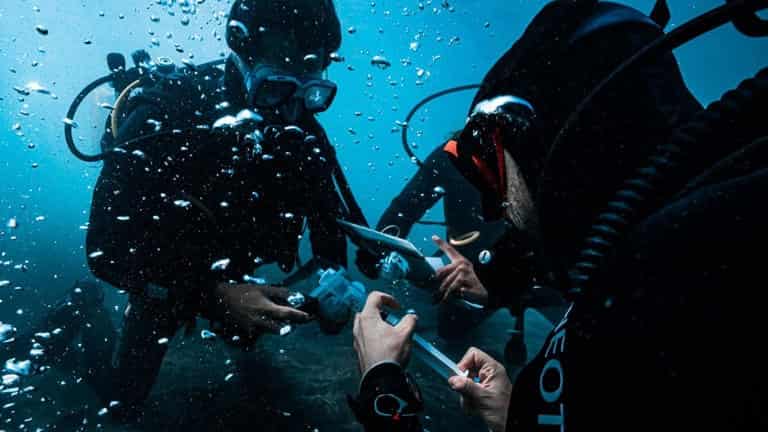Chemical recycling – Blown-film 22-04-2023 - Arhive
Chemical recycling – Blown-film
-Plastics industry survey shows public support for chemical recycling
As the Federal Trade Commission begins rewriting its environmental marketing Green Guides, the Plastics Industry Association is out with a survey that says consumers equally support both older mechanical recycling and newer chemical recycling technologies.
The association also noted prominently in an April 19 news release that its survey found that 62 percent of the public believes that “single-use plastics are important to their quality of life.”
Still, it was public opinion about advanced recycling, as the group calls chemical recycling, that drew most of the survey’s attention. Chemical recycling – Blown-film
How to label plastics made from advanced recycling is likely to be a flashpoint in the debate before the FTC, with environmental groups viewing the technology very skeptically.
But the Washington-based plastics association said a national survey of 1,200 U.S. voters found that consumers “overwhelmingly support” all types of recycling technology when deciding whether materials should be labeled as being recyclable or containing recycled content.
“Consumers don’t discriminate against technologies like advanced recycling which enable them to recycle more of the plastic products they use,” said Matt Seaholm, president of the group. “They want labels or branding to be simple and consistent and are more focused on keeping plastics in a recycling bin and out of the landfill.
“Our goal is to build a more circular economy, and that means enabling consumers to easily find and purchase products and packaging that are designed to be recycled or made from recycled content,” he said.
When FTC launched the Green Guides review in December, one of the questions it asked was how the terms “recyclable” and “recycled content” should be used in marketing.
As well, FTC Chair Lina Khan said consumers are confused about whether plastics collected in curbside programs are actually recycled. Chemical recycling – Blown-film
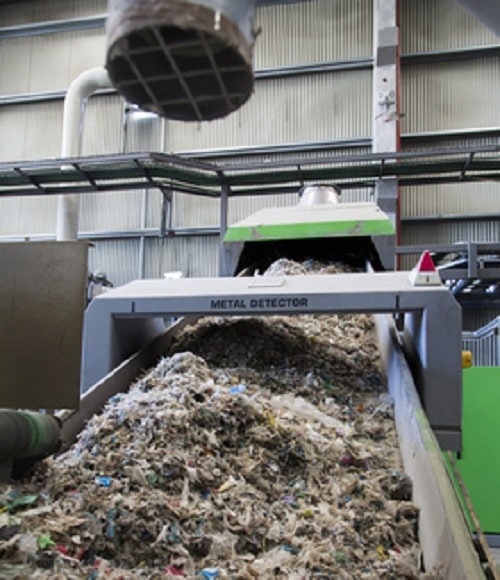
-Evlox incorporates Recover into denim fabrics
Spanish company will launch its first capsule collection called Re-Iconics by Evlox, incorporating recycled cotton fibre.
Madrid headquartered Evlox and Recover have signed a multi-year agreement with the common goal of promoting innovative technologies that will help move towards a circular textiles industry.
As part of the agreement, Evlox commits to purchasing Recover’s recycled cotton fibre, a high-quality fibre created entirely from textile waste and produced with minimal environment impact and incorporating it into its denim fabrics. The agreement is significant for Evlox’s plans to scale its sustainable product offering and fulfils the 2025 objectives set out in its corporate social responsibility program.
Using Recover, Evlox will continue to minimize the use of virgin resources and move towards a circular production model, manufacturing a high-quality denim fabric while significantly reducing its impact. Chemical recycling – Blown-film
As part of the collaboration, Evlox will launch its first capsule collection called Re-Iconics by Evlox, coinciding with the release of its new AW 24-25 collection this month. The vintage capsule collection is a tribute to the classic denim fabrics that have been successful in past decades, adding a sustainable component with Recover’s recycled fibre, produced in Spain.
Alfredo Ferre, CEO at Recover, commented: “Our new partnership with Evlox, a textile manufacturer with a clear sustainable vision at its core, allows us to continue building and scaling a circular and traceable supply chain with Recover, so that we can offer brands a sustainable and high-quality solution.”
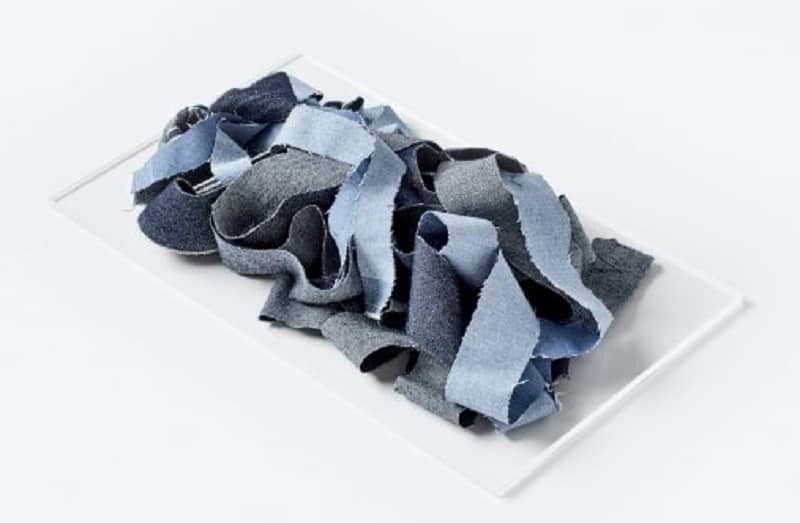
-Elite Plastics invests in 3-layer Bandera blown film line
The line has been developed to produce film with at least 30% recycled content
Elite Plastics, one of the UK’s leading PE extrusion companies, is known for keeping up with the significant advancement and innovation in polymer technologies. Their research and development have enabled them to create ‘recipes’ that enable them to manufacture cutting-edge polythene films for multiple industries. Chemical recycling – Blown-film
To help them stay at the forefront of their industry, the company has invested in a bespoke 3-layer co-extrusion blown film line from Italian designer and manufacturer of complete extrusions line for packaging and converting, Bandera. The line has been developed to utilise at least 30% recycled content into the film recipe whilst still maintaining the technical characteristics Elite’s customers’ demand. It features a compact and functional layout providing Elite with maximum flexibility for a variety of applications. It also has a flexo printing facility.
According to Josh Salmon, commercial director at Elite Plastics, Italy-based Bandera are among the world leaders in building complete blown film lines. The company started in 1947 and with this heritage comes decades of experience and expertise, he said, and they utilise the latest technologies to produce lines that will allow us to drive forward technical innovation in the film market. Elite Plastics asked Bandera to propose a state-of-the-art line for Elite Plastics, and ‘Bandera met the brief perfectly’.
It has been a long process for Elite Plastics to get to the point of commissioning this state-of-the-art line. The site had to be prepared, and crucially the roof had to be raised to provide the required height. Elite took advantage of the opportunity to install a large Solar PV system on the roofs of both their extrusion halls, as part of its Net Zero Strategy.
Film produced on the brand-new Bandera line – and their other lines, for that matter – will have been made partially utilising solar power, reducing the carbon footprint of the products. Chemical recycling – Blown-film
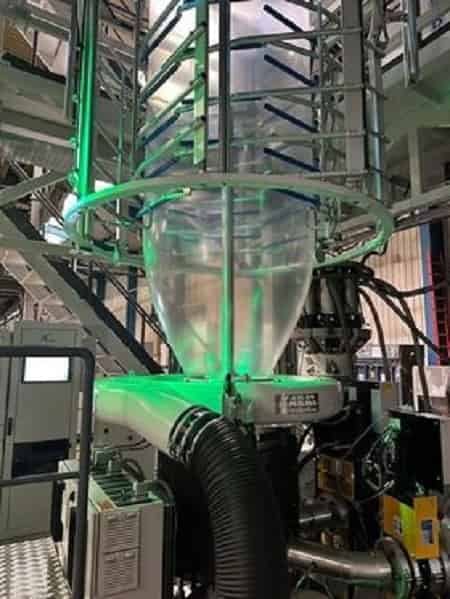
-Eastman announces completion of automotive recycling project
Eastman has announced the successful completion of the closed-loop recycling project for automotive mixed plastic waste. Through a collaborative effort, Eastman, the United States Automotive Materials Partnership LLC (USAMP), automotive recycler PADNOS and global automotive interior supplier Yanfeng, claim they have demonstrated first of its kind plastic recycling from the by-product of shredding end-of-life vehicles.
When automobiles are at the end of their life, metals, tires and glass account for 80%–90% of the materials that can be recycled through traditional mechanical recycling streams. The other 10%–20%, referred to as automotive shredder residue (ASR), consists of mixed plastic and other nonrecycled materials that currently end up in landfills or are recovered through waste-to-energy technologies. Under this initiative, PADNOS supplied a plastic-rich fraction of ASR as a sustainable feedstock to Eastman’s carbon renewal technology (CRT). Chemical recycling – Blown-film
Eastman says it successfully demonstrated addition and conversion of that ASR feedstock into a synthesis gas (syngas) which is subsequently used downstream in the production of its polyester and cellulosic thermoplastics. The company says resins from this production process were further formulated and then supplied to Yanfeng.
The parts moulded by Yanfeng for demonstration were successfully tested to meet a variety of OEM – Ford, GM, and Stellantis – requirements, thereby demonstrating proof of concept for a truly circular solution.
The study proved feasibility of Eastman’s carbon renewal technology (CRT), one of Eastman’s two molecular recycling technologies, which breaks down the plastic-rich ASR into molecular building blocks. By recycling these plastics in CRT, Eastman claims it can replace fossil-based feedstock and create polymers without compromising performance for use in new automotive applications. Chemical recycling – Blown-film
In addition to diverting waste from landfills, USAMP, a subsidiary of the United States Council for Automotive Research LLC (USCAR) also sees the potential for energy savings and reduced overall greenhouse gas emissions.
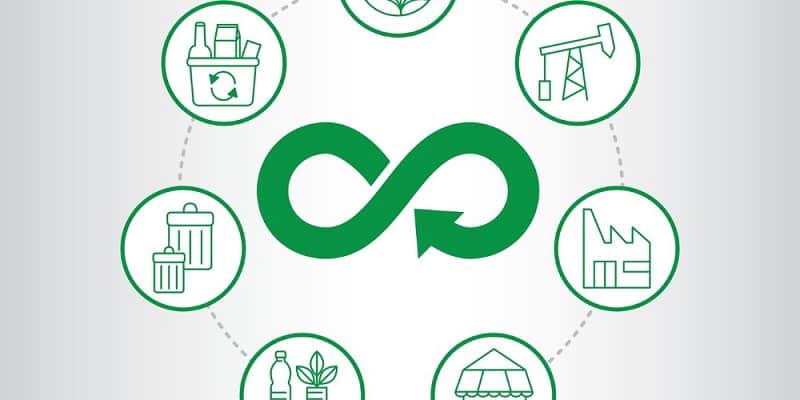
-Advanced Recycling Is Recycling, 88% of Americans Say in Survey
Consumer Survey Based on FTC Green Guides Questions, Serves as Basis for ACC Comments
New consumer perception research shows advanced recycling is a widely supported approach to help recycle more plastics in the U.S. The research, conducted Jan. 30 to Feb. 8, asked Americans questions around recycling and environmental marketing claims relevant to the Federal Trade Commission’s (FTC) planned revisions to its Green Guides. The results showed consumers are supportive of different processes used to recycle post-use plastics — both mechanical and advanced recycling are viewed as equally acceptable processes in the need to increase plastic recycling rates and reduce waste.
The full research report and the evidence-based recommendations from them will be submitted by the American Chemistry Council’s (ACC) Plastics Division to the FTC as the Commission begins a multi-year effort to update the Green Guides.
Joshua Baca, Vice President, Plastics Division Chemical recycling – Blown-film
Consumers are increasingly interested in supporting the environment through their purchases. They are asking for packaging to contain more recycled plastic and that we increase recycling after use, and the data shows people want advanced recycling to be part of the circularity solution.
Since the Guides were last updated in 2012, newer technologies have commercialized that can help significantly increase the recycling of plastic materials. Consumers view these technologies as an important part of improving recycling.
88% of Americans consider advanced recycling to be recycling.
RECYCLED CONTENT: 85% of consumers believe if a new plastic product is made from plastics processed through advanced recycling, the product could have a label saying it contained “recycled content.”
MEASUREMENT: 7 in 10 Americans (72%) believe a certified third-party measurement called “mass balance” is a responsible way to report how much recycled content is in plastic products.
Even more support this approach (74%) when they are told other industries, such as energy, cocoa and coffee, also use it to support sustainability and other claims.
A majority of respondents (64%) support third-party certifications, which provide more credibility and trust of recycled-content claims. Not surprisingly, nearly two-thirds (65%) of the American public want government recognition of independent third-party certifications for recycled content. Chemical recycling – Blown-film
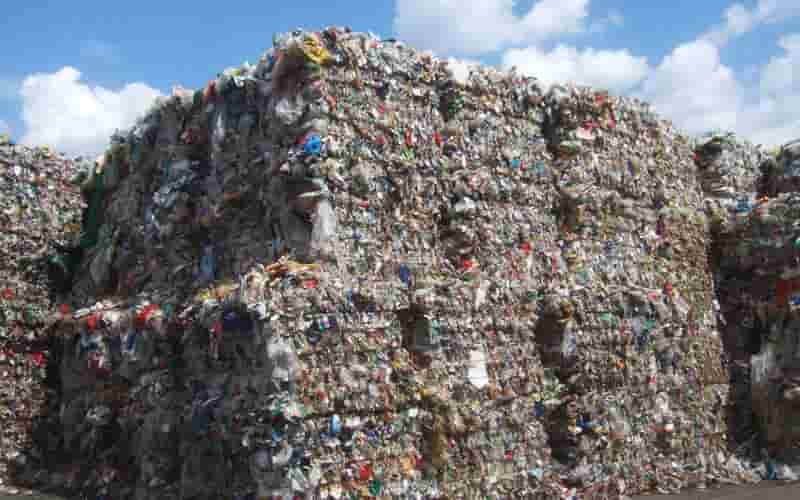
-Program for Plastics Recycling Show Europe
The organisers of Plastics Recycling Show Europe, taking place at RAI Amsterdam, the Netherlands on 10-11 May 2023, have published the event’s full conference program featuring over 60 speakers.
Taking place in two theatres for the first time this year, the free-to-attend event will provide a holistic view of the whole plastic recycling value chain, drawing together political leaders, major brands and the plastics recycling and manufacturing industry.
Political & Legislative Developments
Vivianne Heijnen, Minister for the Environment in the Government of the Netherlands is the keynote speaker for the opening session entitled Plastics Recycling in Europe – paving the way towards circularity. Ton Emans, President of Plastics Recyclers Europe will chair and present this session looking at the latest political and legislative developments in plastics recycling. Joining them on the rostrum will be Wolfgang Trunk, Economic Analyst – Legislation, DG Environment at the European Commission and Lena Stig, Scientific Officer at the Swedish Environmental Protection Agency. Chemical recycling – Blown-film
Design for Recycling
Design for recycling remains as important as ever in improving the circularity of plastics. Speakers confirmed for the session looking at Design Matters: Recyclability is the first step toward circularity include Johannes Daae, Head of Development at Gront Punkt; Scott Trenor, Technical Director at the Association of Post Consumer Plastics Recyclers (APR) and Fabrizio Di Gregorio, Technical Director at Plastics Recyclers Europe.
Materials Focus Sessions
The popular materials focus sessions will explore the challenges, issues and opportunities within the sector for mechanical recycling, covering PET, PVC and Technical Plastics, polyolefin waste streams and polypropylene (PP) recycling. Representatives of major brands participating in these sessions include those from Alpla, Electrolux, Ford Otosan, Berry and Valdelia. Chemical recycling – Blown-film
Chemical Recycling Sessions
Sven Saura, Vice President, Solid Waste Recycling at Veolia will present a future market outlook for chemical recycling, along with Jesper van Berkel, PET Technology & Business Manager at Indorama and Lia Voermans, Director Innovation Strategy at Brightland Chemelot Campus. In addition, a panel discussion on latest technological developments in chemical recycling will be organised with representatives from Ghent University, NextChem and Mura Technology.
Global Market Factors
Samuele Furfari, Professor of Geopolitics and Energy Policy at ESCP London joins the session looking at The push and pull factors impacting the market: working towards a carbon-neutral Europe, alongside Paulina Brzezicka, Advisor Innovation & Digital Finance Advisory at European Investment Bank, Gian de Belder, Technical Director – R&D Packaging Sustainability at Procter & Gamble and his colleague Adam Selby, Purchases Director – Global Resins & Sustainability. Tom Hesselink, Partner Strategy – Deal & Growth at KPMG will present From waste to commodity.
Speakers examining the key issues of Traceability. Transparency. Trust of Recycled Plastic include Adrian Sen, Packaging Sustainability and Innovation Manager at Colgate, Lena Lundberg, Public Affairs and Regulatory Director at Trioworld and Mireia Boada, Project Manager at Plastics Recyclers Europe. Chemical recycling – Blown-film
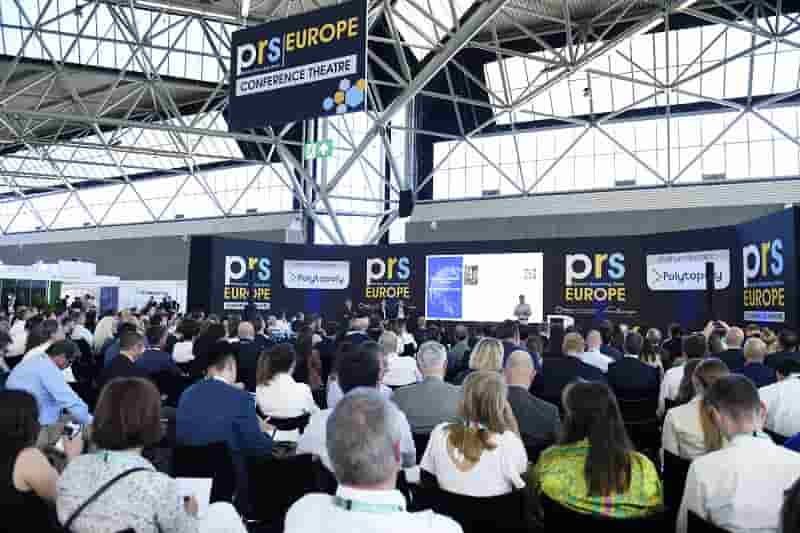
-There is a bacterium that eats carbon dioxide “at impressive speed”. The discovery on the island of Vulcano
Messina, 20 April 2023 – A bacterium that was unknown until recently could become our ally in the fight against climate change. It was discovered in Italy, and to be precise, on the island of Vulcano, by an international team of researchers.
It is a cyanobacterium, an aquatic organism that “feeds” on carbon dioxide. According to the results of the ‘2 Frontiers’ project, led by microbiologist Braden Tierney – who among other things heads NASA’s Microbial Analysis Working Group – is capable of transforming Co2 into biomass “at an impressive speed”, much more faster than any other organism.
“Last September, our first expedition, CARBON1, took us to the Aeolian Islands in Sicily – explains Seed Healh, the company funding the project – Here, we identified never-before-seen green photosynthetic bacteria thriving in the underwater volcanic vents off the of the coast”. Chemical recycling – Blown-film
It is no coincidence that the island of Vulcano was chosen as the destination of the expedition of researchers studying cyanobacteria. The water in these parts is in fact extremely rich in carbon dioxide.
After months of study, the researchers concluded that these bacteria “are so efficient at consuming carbon dioxide” that they outrun the best CO2-eating microbes known to date. It is not difficult to imagine the potential of this discovery for research in the field of carbon absorption and transformation technology.
The Guardian talks about it in a dedicated article. “Researchers hope to use microbes that absorb CO2 to remove greenhouse gases from the atmosphere,” writes Damian Carrington, a journalist specializing in environment and science. Decarbonization is key to curbing the climate crisis but “most scientists agree that even the CO2 will have to be sucked out of the air to limit future damage”.
Mind you, a bacterium is not the panacea. But for Braden Tierny “there will also be circumstances in which we really need a fast-growing aquatic microbe”, explains the scientist interviewed by the Guardian. It could be useful, for example, to be able to create “large ponds that capture carbon”.
In America there are companies that already use bacteria to convert CO2 into biofuels chemicals. “UK-based CyanoCapture, backed by Shell and Elon Musk, is harnessing cyanobacteria to produce biomass and bio-oils.”
The specificity of the ‘new’ bacterium is that it “sinks in water. Which can help collect the CO2 it absorbs.” Chemical recycling – Blown-film
